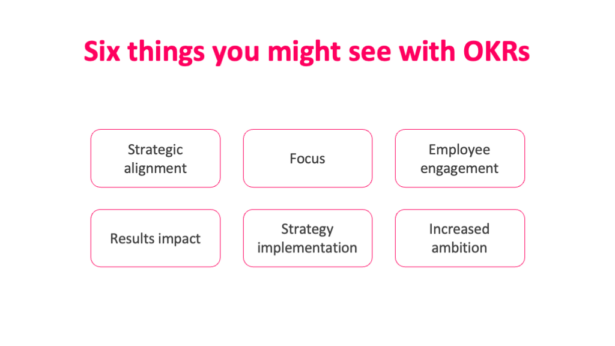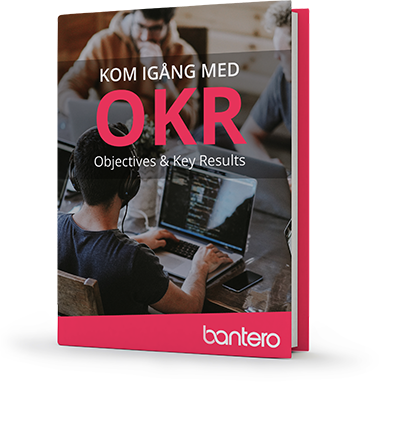Get started with OKRs
We are happy to offer 30 minutes of free OKR coaching to set you on track for your implementation!
Schedule 30m introAll organisations need some kind of organising principle – a way to communicate direction, goals and purpose. Without this, you can hardly consider it to be an organisation since it is just a bunch of individuals performing work together.
This organising principle can however go all the way from a coordinating CEO that regularly talks about what is important at the moment to a strict budgeting and follow-up procedure to ensure everyone pursues the same goals.
In a world with mostly unstructured organising principles and where most organisations invent their own way of running things, there exists a tried and tested framework that has evolved over the years to maximise the positive outcomes that can come from this coordination.

OKRs not only help align the organisation towards common goals, there are several significant spinoff effects of an implementation that each one in some cases can be extensive enough to be the sole purpose of implementation.
Beyond actually producing results in the form of stronger execution towards strategy, there are six tangible strengths that OKRs can deliver to an organisation:
- Strategic alignment
- Focus
- Results impact
- Increased engagement
- Increased ambition
- Strategy implementation
Strategic alignment
OKRs vertically align the organisation in their creation where team OKRs are based on strategic OKRs that in their turn are based on strategy, mission and vision. Horisontal alignment comes from communication and synchronisation of dependencies between managers as the team OKRs are set.
Strong strategic alignment allows the organisation to fully execute on core initiatives and ensures that all resources in the organisation works in the same direction, the value of which can hardly be overstated.
Focus
The OKR process forces organisations to limit the scope of their ambitions to tackle challenges fewer at a time and ensure they see real results before stepping on to the next challenge. This is done by the frameworks limiting principles of 2-3 OKRs for the organisation as well as for each individual team.
With focus, the organisation reaches results quicker and avoids costly context switches. It is a core enabler of efficient execution.
Results impact
Getting used to OKRs is a lot about finding the actual results you try to move with different initiatives and activities. As teams all over the organisation start to question old activities in the pursuit of results impact, it can have a big effect on the overall results of the organisation.
Increased engagement
OKR is a framework meant to engage and bring out ideas and creativity in all teams of the organisation. With employees all over the organisation participating in setting their own team goals – organisations see stronger accountability and commitment towards the goals as well as a stronger sense of meaning and engagement among staff.
Increased ambition
Key results should be ambitious in their nature. They are meant to question how things are done today and force teams to find new ways to achieve more ambitious targets. This mindset is sometimes new to organisations, but when deployed and integrated in the culture it can have a great effect on not only internal ambition, but results as well.
Strategy implementation
The way OKRs create strategic alignment combined with the iterative OKR cycle where team OKRs are often set every quarter or at similar intervall, makes it possible to quickly implement large strategic changes.
Establishing a new strategy can take a very long time in organisations that lack the tools or processes in place to continuously align teams to strategy. With OKRs in place, new strategies can easily be absorbed by the teams in the organisation which makes swifter strategic moves possible.
/6 completed Getting started articles
Get started with OKRs
We are happy to offer 30 minutes of free OKR coaching to set you on track for your implementation!
Schedule 30m intro